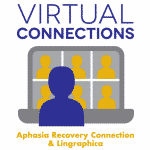Aphasia In The News
After the recent news broke about Bruce Willis’ diagnosis of aphasia, more and more people have been asking, “What is aphasia?” We had the opportunity to speak about aphasia and its impact on those diagnosed with it, their loved ones, and what resources Lingraphica has to offer to the Spanish-speaking community and Univision.
Video Transcript
Elián Zidán: We will talk about what is happening with the actor Bruce Willis who was diagnosed with aphasia, and also how is has ended his career in the cinema. In fact many people want to know more about this neurological disorder and for this have invited Michael Bord, who is a manager at Lingraphica and is here to explain how they are providing help to people who have aphasia, and also what tools that can be provided. Michael very good evening. Thank you very much for being with us.
Michael Bord: It’s a pleasure.
Elián: And well first of all I’m asking you about this disorder that is not new, but it has gained this notoriety as a result of actor Bruce Willis as he publicly said that he suffered from it he suffered from it, but I would also like to go a little further on how it develops.
Michael: Yes, the news of Bruce Wills was really very sad, but it has caused, a bit of curiosity in the public, because the word aphasia is not a common word and many people don’t know what it is. So the first thing to understand is that aphasia is very common. It affects approximately 2,000,000 people in the United States. And physically it occurs when there is damage to the brain in the parts that are responsible for speech and language. It usually happens after a stroke or injury, but can also be caused by degenerative conditions. It can affect speaking, writing, reading, and comprehension, but the important thing to know is that it does not affect the person’s intelligence.
Elián: And Michael what ones are maybe the most common symptoms or signs to be able to detect aphasia.
Michael: Yes, well, typically if you have a loved one who is forgetting words or unable to produce sounds, it is best to see a doctor and see what kind of diagnosis they can give you.
Elián: And well, we also know that you and your company are doing a great job to help these people. It’s called Lingraphica. What is the purpose they have and also how are they providing this much-needed help to people who have aphasia, and how can they reintegrate into those activities they enjoyed so much?
Michael: Yes at Lingraphica we develop communication devices that allow people with aphasia to express themselves. We also offer a lot of free educational resources, and, for example, one of these resources is an online community for people with aphasia and their loved ones. And everything is free. You can learn more at www.lingraphica.com.
Elián: And to finish, I would like to talk about a specific case that really moved us a lot when we saw it. And I would like you to tell us a little more about how the assistance given to this woman so she was able to make enchiladas again. What can you tell us about this recent experience?
Michael: Yes, Raquel is a device user who lives in Texas and she suffers with aphasia, and her daughter reached out to us, wanting to know how we have helped her and, you can see in her video, she is teaching us, with her device, how to make enchiladas.
Elián: Honestly those enchiladas looked very succulent and a good time for Raquel and for you giving a necessary hand for people with this condition. Michael, I really appreciate you being with us tonight.
Michael: Same to you.
Elián: Good night. Thank you very much.

Lingraphica Can Help
We help adults with speech and language impairments to reconnect with family and friends, improve communication, and live their best lives. Call us at 866-570-8775 or visit the link below to get started.

An Entire Community at Your Fingertips
Connect with hundreds of individuals with aphasia and their loved ones from anywhere in the world for FREE. Click the button below to learn more.








